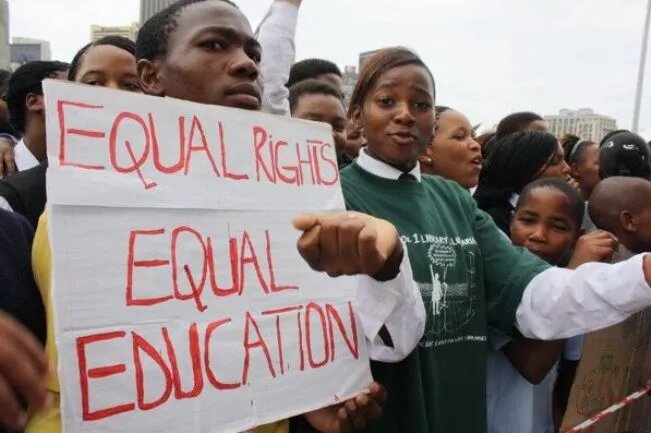
Over 2000 Equal Education (EE) members will be marching to the Western Cape Provincial Legislature on Friday 31 October, where they will hold a rally against educational inequality. Speeches, describing a wide range of challenges facing schools will be made by equalisers from across the Cape Peninsula, and a memorandum will be handed to MEC for Education Debbie Schafer.
This rally brings together months of campaigning undertaken by equalisers in schools in Khayelitsha, Kraaifontein, Nyanga, Strand, the City Bowl and other areas. These “school-based campaigns” represent a democratic process whereby EE’s membership identified and took up campaigns on issues impacting their learning. School-based campaigns are a regular part of EE’s work, in addition to the national campaigns undertaken collectively by the whole movement.
Under the banner “Fight Educational Inequality” EE’s members are rallying to bring their school-based campaigns to the attention of their government. Equalisers will demand support in their efforts to secure improvements to their schools in the following areas: dignified sanitation, quality school infrastructure, quality teaching and textbooks, computer centres, libraries and labs, justice for teenage pregnancy, access to condoms and sex education, end corporal punishment, safe schools, and after school sports and cultural programmes.
This process began a few months ago with equalisers identifying the problems in their schools. Each school chose an issue that critically affected the learners at that school. Equalisers then started engaging with schools principals and mobilising fellow students, parents, teachers and community members. The weekly youth group meetings were used to strategise and develop campaigns, many of which have made an impact at school and community-level. But provincial support is essential for wide-spread improvements on various issues.
The banner of educational inequality has been chosen because this is a critical context in which specific problems play themselves out across the country. Many learners who attend rural and township schools experience a substandard education every day; this is partly due to poor delivery of educational services and partly due to the extreme and shocking inequality that exists in the education system. Poor administration and service delivery are defining features of more rural provinces where EE is active, such as KZN, Limpopo and the Eastern Cape. Inequality is is a defining feature of more urban provinces such as Gauteng and the Western Cape. Addressing both poor educational service delivery and inequality will require a cooperative approach to tackling corruption and the unconstitutional prioritsation of resources across government departments, all spheres of government, and the private sector.
When EE members in the Western Cape articulated their campaign choices, many said they felt unsafe when walking to or from school, knowing that the Report of the Khayelitsha Commission of Inquiry into policing had stated: “One of the questions that most troubled the Commission is how a system of human resource allocation that appears to be systematically biased against poor black communities could have survived twenty-years into our post-apartheid democracy.”
Other learners complained of poor quality teaching, knowing that there is no systematic mechanism to recruit stronger teachers into weaker schools, and that the allocation of teacher posts, which accounts for about 80% of provincial education spending, is not done on a pro-poor basis.
Others complained of not having libraries or science laboratories, knowing that these are plentiful in the private and public schools closer to Table Mountain. And many called for after-school sports and other extra-murals, a standard part of school-life in middle-class communities, but rare in Khayelitsha schools. Learners are well aware that the absence of these programs drives youth gang membership in their areas.
It’s clear that learners in these schools are not only subjected to inferior education but also have some of their rights violated, particularly many learners subjected to coporal punishment, denied access to sex education and contraception, and girls excluded as punishment for falling pregnant.
Therefore on 31 October over 2000 learners will gather and march to the provincial government. Equal Education expects that their legitimate demands will be taken seriously by the new MEC for Education, Debbie Schafer, and that she will convene a process to engage meaningfully with learners about their concerns. EE met with MEC Schafer on Tuesday to give her advance notice of its expectations in this regard
The march will start at 3pm moving from Kiezergrachtt to a rally at the provincial legislature in Wale Street where equalisers will speak about the deep challenges in their schools and the campaigns they have taken up to address them.
The public is invited to attend.